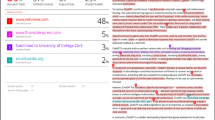Abstract
Many have claimed that education of the ethical issues raised by biotechnology is essential in universities, but there is little knowledge of its effectiveness. The focus of this paper is to investigate how university students assess the information given in class to make their own value judgments and decisions relating to issues of agricultural biotechnology, especially over genetically modified organisms (GMOs). Analysis of homework reports related with agricultural biotechnology after identification of key concepts and ideas in each student report is presented. The ideas were sorted into different categories. The ideas were compared with those in the reading materials using the same categories. These categories included: concern about affects on humans, affects on the environment, developing countries and starvation, trust in industry, responsibility of scientists, risk perception, media influence, need for (international) organizations or third parties, and information dissemination. What was consistent through the different years was that more than half of the students took a “neutral” position. A report was scored as “neutral” when the report included both the positive and negative side of an issue, or when the student could not make a definite decision about the use of GMOs and GM food. While it may be more difficult to defend a strong “for” or “against” position, some students used logical arguments successfully in doing so. Sample comments are presented to depict how Japanese students see agricultural technology, and how they value its application, with comparisons to the general social attitudes towards biotechnology.
Similar content being viewed by others
References
Macer, D. (1992) Attitudes to Genetic Engineering: Japanese and International Comparisons, ISBN 0-908897-02-2 (Japanese and English), Eubios Ethics Institute, Christchurch, NZ.
Hoban, T.J. (1997), Consumer acceptance of biotechnology: An international perspective, Nature Biotechnology 15: 232–4.
Inaba, M. and Macer, D. (2003) Attitudes to biotechnology in Japan in 2003, Eubios Journal of Asian and International Bioethics 13: 78–89.
Hayashi, S. and Macer, D. (1999) The reporting of genetic engineering in the Japanese media since 1973, Eubios Journal of Asian and International Bioethics 9: 105–108.
Chen Ng, M.A., Takeda, C., Watanabe, T. and Macer, D. (2000) Attitudes of the Public and Scientists to Biotechnology in Japan at the start of 2000. Eubios Journal of Asian and International Bioethics 106: 106–13.
MAFF Ministry of Agriculture, Forestry and Fisheries, Japan. Homepage. www.maff.gov.jp.
Macer, D. (1994) Bioethics for the People by the People; 460pp., ISBN 0-908897-05-7, Eubios Ethics Institute, Christchurch, NZ.
Asada, Y., Akiyama, S., Tsuzuki, M., Macer, N.Y. and Macer, D.R.J. (1996) High school teaching of bioethics in New Zealand, Australia, and Japan. Journal of Moral Education 25: 401–420.
Asada, Y. & Macer, D. (1997) Establishment of High School Bioethics Education Network, Eubios Journal of Asian and International Bioethics 7: 73–77.;
Asada, Y. & Macer, D. (1998) “High school bioethics education network in Japan”, pp. 152–166 in Bioethics in Asia, eds.: N. Fujiki, N. and Macer, D. (Eubios Ethics Institute, 1998).
Komatsu, H. & Macer, D. (2000) Expectations of biotech of Japanese high school students in 1998, Eubios Journal of Asian and International Bioethics 106: 142–56.
Takeishi Oka and Macer, D. (2000) Change in high school student attitudes to biotechnology in response to teaching materials, Eubios Journal of Asian and International Bioethics 106: 174–9.
Lock, R. and Miles, C. (1993) “Biotechnology and genetic engineering: students’ knowledge and attitudes”, J. Biological Education 27: 267–72.
Pandian, C. and Macer, D. (1997) “Bioethics Education in High Schools: An Investigation in Tamil Nadu with Comparisons to Australia, Japan and New Zealand”, pp 390–400 in Azariah J., Azariah, H., & Macer, D., eds, Bioethics in India (Eubios Ethics Institute).
Macer, D. and Chin Choon Ong, (1999) Bioethics education among Singapore high school science teachers, Eubios Journal of Asian and International Bioethics 9: 138–145.
Dawson, Vaille and Taylor, Peter (1997) The Inclusion of Bioethics Education in Biotechnology Courses, Eubios Journal of Asian and International Bioethics 7: 171–175.
Inoue Kaneo (2000) Bioethics Education in Japanese High schools, ed., Macer D., Eubios Ethics Institute, pp.40–48.
Japanese Ministry of Education homepage 〈http://www.mext.go.jp/b_menu/shuppan/sonota/990301i.htm〉 (In Japanese)
Macer, D., Inaba, M., Maekawa, M., Ng, MC., and Obata, H. (2002) Japanese attitudes towards xenotransplantation. Public Understanding of Science 11, 347–62.
Godfrey, J. (1998) Beefing up the food police. Nature 395: 855–856.
Masood, Ehsan (1999) Gag on food scientist is lifted as gene modification row hots up... Nature 397: 547.
Kazhila Chinsembu and Tamala Kambikambi (2001) Farmers’ perceptions and expectations of genetic engineering in Zambia, Biotechnology and Development Monitor 47: 13–14.
Coghlan, A. (2002) Weeds do well out of modified crops. New Scientist 17 August: 11.
Macer, D., Azariah, J. and Srinives, P. (2000) Attitudes to biotechnology in Asia, International Journal of Biotechnology 2: 313–332.
Macer, D. (2002) The next challenge is to map the human mind, Nature 420: 121.
Groth III, Edward (2001) The Debate Over Food Biotechnology in the United States: Is a Societal Consensus Achievable? Science and Engineering Ethics 7: 327–346
Macer, D., Bezar, H., Harman, N., Kamada, H. and Macer, N. (1997) Attitudes to Biotechnology in Japan and New Zealand in 1997, with International Comparisons, Eubios Journal of Asian and International Bioethics 7: 137–151.
Macer, D. & Chen Ng, M. (2000) “Changing attitudes to biotechnology in Japan”, Nature Biotechnology 18: 945–7.
Macer D., Inaba, M., Maekawa, M., Ng, MC., and Obata, H. Japanese attitudes towards xenotransplantation. Public Understanding of Science 11, 347–62.
Maekawa, F. and Macer, D. (2001) Interactive bioethics in a focus group on life and biotechnology in Japan, Law and the Human Genome Review 15: 173–201.
Author information
Authors and Affiliations
Corresponding author
Rights and permissions
About this article
Cite this article
Maekawa, F., Macer, D. How Japanese students reason about agricultural biotechnology. SCI ENG ETHICS 10, 705–716 (2004). https://doi.org/10.1007/s11948-004-0048-y
Received:
Accepted:
Issue Date:
DOI: https://doi.org/10.1007/s11948-004-0048-y




